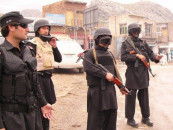Roundtable: Opportunity of course-correction for the US
Obama admin should halt drone attacks, resolve issues with Iran: senator.

Now is the time for President Obama to correct the course of flawed US policy towards Pakistan, as he does not have to worry about re-election.
This was stated by Senate Standing Committee on Defence and Defence Production Chairman Senator Mushahid Hussain at a roundtable organised by the Institute of Regional Studies (IRS) on Tuesday, said a press release issued by the institute.
Senator Hussain maintained that President Obama was re-elected at a time of declining international political clout of the US. He argued that President Obama won re-election despite strong and vocal opposition from Israel, which, he added, was unusual. He added that there were many flaws in US policy towards Pakistan in the first term of President Obama such as misuse of the drone technology, wanting Pakistan to facilitate negotiations with the Taliban on the one hand and asking it to launch operations against them on the other, and trying to bypass Pakistan in reaching out to Taliban leadership for talks.
He stated that Pakistan would expect the new Obama administration to halt drone attacks, which, he argued, were a violation of international law and cause civilian deaths. He added that Pakistan would also want the US to include Pakistan in any reconciliation process in Afghanistan, and that Pakistan would expect the US to resolve its problems with Iran diplomatically. However, he said that Pakistan will also have to be more firm in its opposition on drone attacks.
Hussain argued that while China was concentrating on economic development, one of its main concerns was the growing economic disparities across regions. He maintained that China is a more open society than ever before, with more than 400 million bloggers expressing their opinions on the internet.
The senator argued that while NATO had decided to withdraw from Afghanistan by 2014, Pakistan also needed some realignment of its Afghan policy. He was of the view that signs of changing policy perceptions in Pakistan are evident from the fact that it is now calling for a “peaceful, stable, and united Afghanistan,” rather than a “friendly Afghanistan.” He added that China was also showing keen interest in Afghanistan and had recently concluded economic and security agreements with it during the visit of China’s domestic security chief Zhou Yongkang and a member of the Communist Party’s central Politburo in September.
About the domestic situation in Pakistan, Senator Hussain argued that dynamism was visible in the country. He said that power had gotten diffused into multiple centres such as the executive, the judiciary, the legislature, the media, the military, and even the civil society, however, it is the freest Muslim democracy of the world where there is vocal media and open civil society.
“Sometimes the political elite of Pakistan appear out of sync with the fast pace of the developing civil society in the country,” said Hussain. He added that a civilian government completing its full-term would be a milestone in the country’s political history.
Ambassador BA Malik argued that Pakistani decision-makers will have to evolve consensus over the sort of change they want to bring about in the country and respond to international expectations from Pakistan.
Published in The Express Tribune, November 14th, 2012.



















COMMENTS
Comments are moderated and generally will be posted if they are on-topic and not abusive.
For more information, please see our Comments FAQ